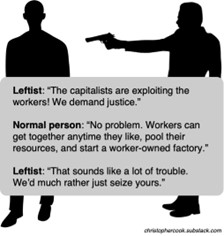
They Could Have Had Worker-Owned Factories Anytime
But they wanted yours.
By Christopher Cook – February 7, 2024
I continue to be surprised—though obviously I shouldn’t be—by the fact that people still express Marxian ideas here in 2024.
I am sympathetic to aspects of some of the arguments, and certainly to the compassionate impulses that impel people to make them. And to be sure, I am not a fan of massive corporations—certainly not the kind that are in bed with government (and that is basically all of them, to one degree or another).
The Freedom Scale is a reader-supported publication. To receive new posts and support my work, consider becoming a free or paid subscriber.
But there is also something so frustratingly hackneyed about the “exploitation” theme that comes up again and again.
It is essential to understand, as a basic framework for this discussion, that Marx was wrong about virtually every prediction he made. But more than that—there was something so fundamentally dishonest about the whole enterprise—especially in the decades that followed Marx’s work. I will explain…
What was it they said? The workers should own the means of production.

Then they claimed that the workers should use violence to seize those means of production. (And when that didn’t happen spontaneously, a “revolutionary vanguard” used the violence on their behalf.)
But means of production—factories, etc.—are not a static resource like a lake or a mountain. They are created by people.
I do not know enough about economic history to know whether workers in 1850 would have been forcibly prevented from starting a worker-owned factory. I suspect it depends where. But they certainly could have in the years since.
But the left have never clamored for “the right to raise our own capital and start our own worker-owned factories.” They have always asserted that it is their “right” to seize factories built by other people.
Nothing is stopping anyone from making worker-owned factories.
Nothing is stopping anyone from making factories with better conditions for workers. Indeed, “utopian socialist” Robert Owen did just that at the end of the 1700s, and it worked pretty well. (Then he became more explicitly leftist and started a bunch of communes that failed.)
Nothing is stopping anyone from starting a business that employs holacratic rather than hierarchical organizational systems.
Nothing is stopping anyone from starting businesses from sharing profits differently (as Chobani has done).
There are impediments and ways in which our economies are less free than they ought to be. But as an aggregate phenomenon, Western economic systems have been entirely open, for a long, long time, to any such business endeavor that anyone wants to start.
Robert Owen proved it could be done (in Britain, at least) in the late 1700s. And yet most of the left’s approach has not been to fight for the freedom to engage in such endeavors. Their primary goal has been to redistribute the fruits of others who have engaged in such endeavors.
Start your own thing. Run it how you like. The system allows it!
Unfortunately, the left’s redistributive ethos took over all of Western society, and now everyone just assumes that some amount of taking from others, by force, is not only morally acceptable, but morally good.
It isn’t. The sooner we realize that, the sooner we can move to a more peaceful society in which people help each other voluntarily rather than at the point of a gun. We also have to move beyond the pathological human obsession to impose single ways of living on large groups of people.
Instead of building a business and running it their way, people simply opine that all businesses ought to be run a certain way. They don’t even have the courage to ride up on horseback, point guns at the business owner and owner and say, “We are taking this for ‘the workers.’” They just hide behind government’s skirts and ‘demand’ that a law be passed that points the guns for them.
If they were serious about wanting worker-friendly enterprises, they could have made them at any time. But they were never serious about making. Only taking.
